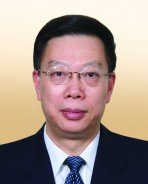

Mr Pro-Chancellor,
Professor Huang Jiefu is a surgeon who has so distinguished himself to become one of the world's foremost experts in performing liver and kidney transplantations. Further, during his tenure as a senior Government official, he was instrumental in planning and implementing significant measures to modernise China's medical services.
Professor Huang was born in Hunan Province. His father worked in a bank and his mother as a teacher in a kindergarden. Sadly his father passed away when he was still quite young. One of his father's last wishes, expressed on his hospital bed, was that his son should become a doctor. Being an obedient son he did so. I am sure his father would be very proud that his son not only became a doctor but one of the world's most eminent doctors.
Professor Huang graduated from Sun Yat-sen Medical College, Guangzhou, in 1969 and subsequently became one of the first group of graduate students majoring in liver transplantation in China. He was then sent to the University of Sydney for his post-doctoral medical training.
Having returned to China he was appointed first Director, then Deputy Manager, then Vice-President and finally President of the Sun Yat-sen University. During that time his speciality was the treatment of liver and gall bladder malignant tumours. He pioneered liver transplantation in China by applying international advanced technologies and engaged in research into liver and kidney transplantation. He successfully performed the first Chinese liver transplantation in 1994 and was the first Asian to perform a combined liver-kidney transplantation in 1997. Indeed, he was recognised as the leading surgeon in performing such transplantations in China.
In 2001 Professor Huang was appointed to the prestigious post of Vice-Minister in the Ministry of Health, a post he held until 2013. He set as his urgent task the modernisation of China's medical system. At this he has scored many successes. Time only permits me to mention a few.
First, he successfully founded and chairs the National Organ Donation and Transplantation Committee, which has enabled China to establish a national organ donation and transplantation system.
Secondly, he has taken the first steps towards introducing a system whereby doctors with specialist skills can gain accreditation. Hong Kong has had such a system for many years and Professor Huang has been responsible for many Mainland doctors and surgeons coming to Hong Kong to take our examinations to gain accreditation. His goal is to introduce a similar system of specialist accreditation on the Mainland and four such registries have now been established.
Thirdly, he has espoused greater involvement in and support from the Central Government for the more than 800 private hospitals in China.
Finally, and perhaps most close to our hearts, has been his initiative in founding the Hong Kong University-Shenzhen Hospital. One of its main purposes is to serve as a model for China by providing first class medical services to those in need, irrespective of the wealth or status of the patient. He also envisages the hospital as a bridge between Hong Kong and the Mainland for further medical co-operation.
After retiring from Government in 2013, Professor Huang resumed his medical practice as the Director of the Department of Liver Surgery at Peking Union Medical College Hospital. He has published numerous monographs and academic papers and is an honorary professor at many universities including Harvard, MIT, Stanford, the University of Sydney, Peking University and Tsinghua University.
In 2008 he received a special award from the International Transplantation Society and in 2013 was honoured by the World Health Organization for his outstanding achievements in tobacco control in China. He is an Honorary Fellow of the Hong Kong Academy of Medicine and the Royal College of Surgeons in Edinburgh.
When I asked Professor Huang of his aspirations, he replied:
"My dream as a transplant surgeon is to establish an ethical, sustainable and healthy organ transplantation system consistent with internationally accepted ethical standards to meet the needs of the Chinese people".
He has made strenuous efforts to make that dream a reality.
In conclusion Professor Huang has distinguished himself as an outstanding surgeon, an enlightened and reform-minded Government official and, last but not least, a professional peer and generous collaborator with our University.
Mr Pro-Chancellor, it is my honour and privilege to present to you Professor Huang Jie fu for the award of Doctor of Social Sciences honoris causa.
Citation written and delivered by Professor Michael Wilkinson, the Public Orator of the University.



